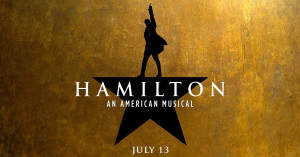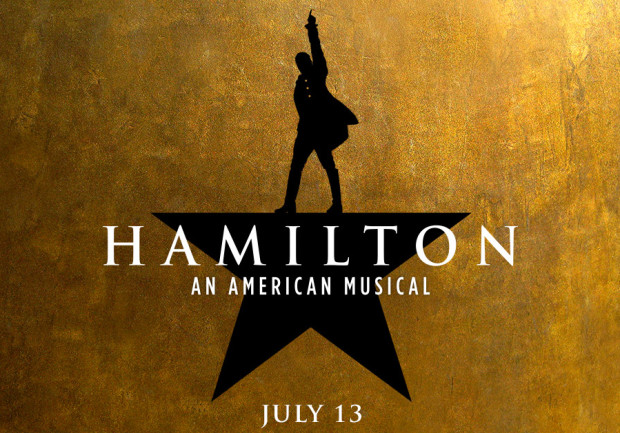 I’ve been listening to the soundtrack to Hamilton for the last few hours after listening to it for the entire flight from San Francisco to Minneapolis. It’s entirely clear to me why this musical is striking the chord that it does with the audiences, and likely the Tony Awards in the next run. It’s pure brilliance in so many ways. It brings a modern music style to the production of the sound with the incorporation of hip hop elements, scratching records, rap, and blends that in with increasingly familiar musical and lyrical themes that echo across the over two hours of soundtrack. Additionally, it hits home for the American audience with the locality and story being told. This happens two fold with the incorporation of the bootstrapping lead in Alexander Hamilton pulling himself up with the use of his wits and brilliance that brought him to the point of creating an organization that still stands today in the National Bank. But it stretches far beyond that as Hamilton is one of the most unsung founding fathers of the United States, even at this time likely being removed from his featured position on the ten dollar bill in favor of placing the first woman on paper currency in the US. Heroes from our country’s origins trickle in and out of the story with Washington, Lafayette, Jefferson, Adams, Madison, and Burr – men whose names have so often been spoken by us in our childhoods as we learn how we reached the point where we are now only to find that we no longer think of our origins while moving forward with our lives into adulthood.
I’ve been listening to the soundtrack to Hamilton for the last few hours after listening to it for the entire flight from San Francisco to Minneapolis. It’s entirely clear to me why this musical is striking the chord that it does with the audiences, and likely the Tony Awards in the next run. It’s pure brilliance in so many ways. It brings a modern music style to the production of the sound with the incorporation of hip hop elements, scratching records, rap, and blends that in with increasingly familiar musical and lyrical themes that echo across the over two hours of soundtrack. Additionally, it hits home for the American audience with the locality and story being told. This happens two fold with the incorporation of the bootstrapping lead in Alexander Hamilton pulling himself up with the use of his wits and brilliance that brought him to the point of creating an organization that still stands today in the National Bank. But it stretches far beyond that as Hamilton is one of the most unsung founding fathers of the United States, even at this time likely being removed from his featured position on the ten dollar bill in favor of placing the first woman on paper currency in the US. Heroes from our country’s origins trickle in and out of the story with Washington, Lafayette, Jefferson, Adams, Madison, and Burr – men whose names have so often been spoken by us in our childhoods as we learn how we reached the point where we are now only to find that we no longer think of our origins while moving forward with our lives into adulthood.
These men that came before us stood for the ideals of freedom and fought for it. They battled endlessly as we still do today, but their stakes were slightly different as they were attempting secession and we currently seem to be struggling with individual ideology of a religious basis. Our country has always had a bit of a church state to it due to the overwhelming influence that religion had in the lives of the earlier settlers and founders of this nation. Hearing one specific lyric where Washington is telling Hamilton that he will be stepping down as president and wants to show the country that it’s ok to move on but to be wary of political party disputes rings with particular weight given the political climate in the modern time.
This story, though, is the life of Alexander Hamilton, represented as a brilliant mind, brash but eloquent wordsmith, a loving father, an imperfect husband, and a man that favors honor. The continuing lyrical request from his wife throughout the performance is “would that be enough?” A man who is self admittedly never satisfied and constantly looking for the next big push and the next challenge that will help move the country forward is perpetually at war within his own life. Does he stay at home and be the family man and father that his wife would like him to be, or does he follow the call to lead and to be the fulcrum, the thinker, and allow his ambitions to take hold and push him forward with what comes next? And there’s a particularly obvious relation to this story for me: the relentless ambition and work and a tireless mind.
“Why do you write like you’re running out of time?” Hamilton’s friends ask time and time again. Why does the man sit there and pontificate endlessly about the things that happening, writing essay after essay defending the things that he believes in and wants to see come to fruition? The answer is directly in the question – he wants to see these things develop and grow in order to create a better world. Burr continually urges Hamilton throughout their friendship that it would be better if he were to “talk less,” and “smile more,” while giving less of his controversial opinions air to breathe as it just gives ammunition to his enemies to attack him for his stance and provoke him into potential rash mistakes. He of course falls into the trap, possessing a singular vision for what he wants to see this country become.
Hamilton’s needs to develop and defend himself and his beliefs in order to preserve the legacy that he’s trying to build are ultimately the things that undo him the most. This is another trait that I strongly relate to with the battle to look at one possible variation of what a better world might look like and the desire to fight to make it happen. I see so much brilliance in the people that I’m around, but I also see incredible thoughtlessness and carelessness, while simultaneously knowing that I too deal with bouts of getting caught up in my vision for the future. The possibilities of what could be are hampered for so many reasons that it becomes a house of cards to achieve the bold moves of success on a grand scale – if even one of those things waivers and falls then the whole concept goes out the window.
I have currently reached a point of exhaustion feeling like I’m perpetually fighting with people about many things that I would consider to be day to day type arguments while unable to address the root causes and the future ignoring them yield. Often times it feels as though the bigger picture is continually lost in the haze of the little mistakes that occur with each project that crosses my desk. We all color the final result of each day to day task with how we want to see the supporting materials we need in order to be more successful at our jobs and lives. In the time crunch that often seems to take over it seems like the reason to take the step back and look at the wider mitigating factors becomes lost in the symptoms of systemic failures.
I don’t necessarily want to be the guy out in front of the argument as many seem to see me when I talks to them, but to be someone that’s fighting the fights that make a real difference in the world gives me a sense of satisfaction. Maybe there’s a certain safety in that position because to most folks there’s nothing at stake and no one expects me to win these larger fights that I take on so there’s less of a risk involved in my attempting to do something larger than myself in that respect.
I’m absolutely following in line with Hamilton in that I am very rarely satisfied and I want to believe that I can leave some sort of legacy behind that demonstrates something was accomplished with the time that I had here. To paraphrase from the show, a legacy is like planting seeds in a garden that you’ll never get to see. I will never see these things that I hope to accomplish. It won’t be me that reaps the rewards of these activities; it will be those that come after me. The last line of the show, though, demonstrates how futile a person’s desire for a legacy is as it will be up to those that knew me, and those that come after me to tell my story. I have no control over what story will be told, but I just pray that there will be a story to be told.

